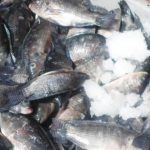ESSP Working Paper 120, by Michael L. Mann, James M. Warner, and Arun S. Malik. Abstract: Timely and accurate agricultural impact assessments for droughts are critical for designing appropriate interventions and policy. These assessments are often ad hoc, late, or spatially imprecise, with reporting at the zonal or regional level. This is problematic as we find >> Read more Source: Ethiopia Strategy Support Program
Is Ghana ready for a blue revolution?
Fish is an important food product in Ghana, accounting for 60 percent of the national dietary animal protein. Increasing urbanization and corresponding dietary shifts have fueled rapid increases in demand for certain types of fish. In Accra, for example, consumers have shifted in recent years from salted and smoked fish to consuming large quantities of fresh tilapia, much of it prepared by roadside restaurants. With regards to production, the presence of one of the largest man-made lakes in the world, the Volta, provides an almost-ideal resource for cage culture in Ghana.
Is Ghana ready for a blue revolution?
Fish is an important food product in Ghana, accounting for 60 percent of the national dietary animal protein. Increasing urbanization and corresponding dietary shifts have fueled rapid increases in demand for certain types of fish. In Accra, for example, consumers have shifted in recent years from salted and smoked fish to consuming large quantities of […] Source: IFPRI Ghana
New Publication Announcement: NSSP Working Paper Looks at Grain Price Seasonality in Nigeria’s Kebbi State
We are pleased to announce the publication of Working Paper 51 from the International Food Policy Research Institute (IFPRI)’s Nigeria Strategy Support Program (NSSP) entitled “Grain price seasonality in Kebbi state, Nigeria”. The paper is the product ... Source: IFPRI Nigeria Country Office
Improving the competitiveness of Ghana’s vegetable sector
Vegetables make up a large proportion of food consumption in Ghana comprising 12.8% of food expenditure (GLSS 2012/13). However, despite favorable agro-ecological conditions, local vegetable production fails to meet demand. Low yields and restricted access to marketing networks characterize the vegetable sector in the country, presenting a challenge as far as competitiveness and production incentives […] Source: IFPRI Ghana
